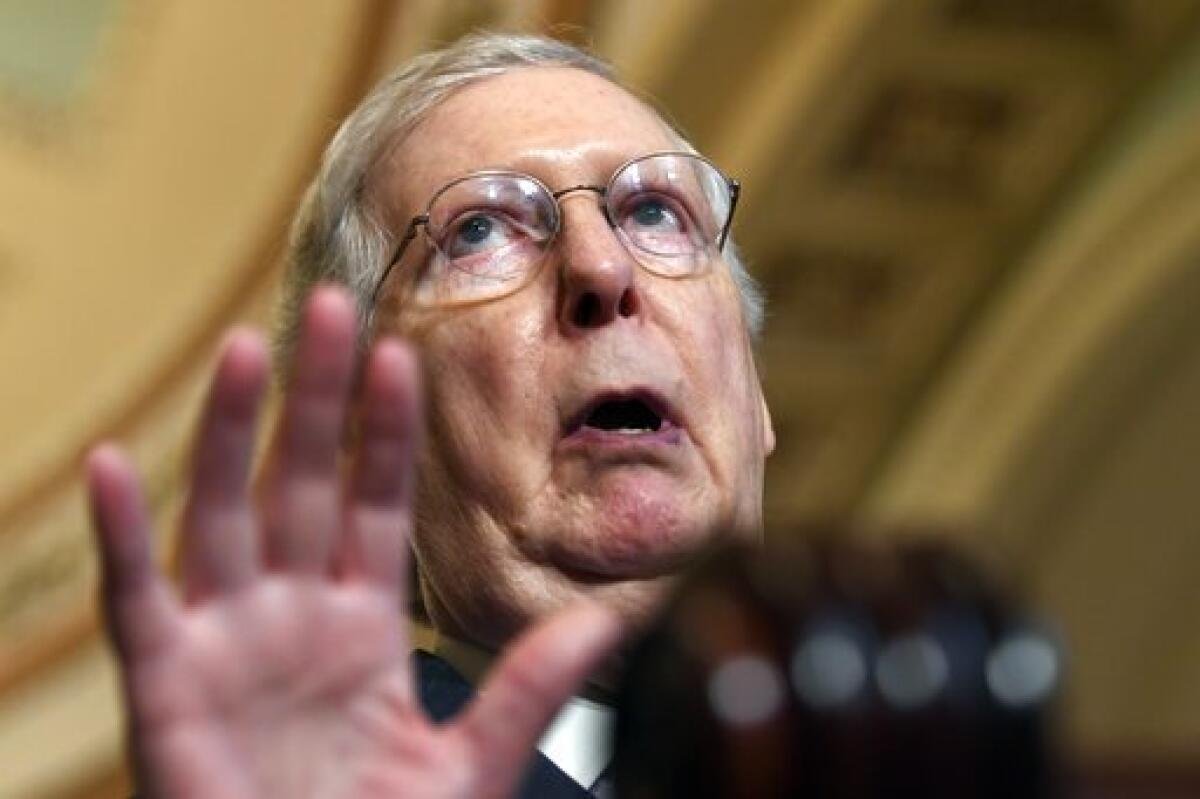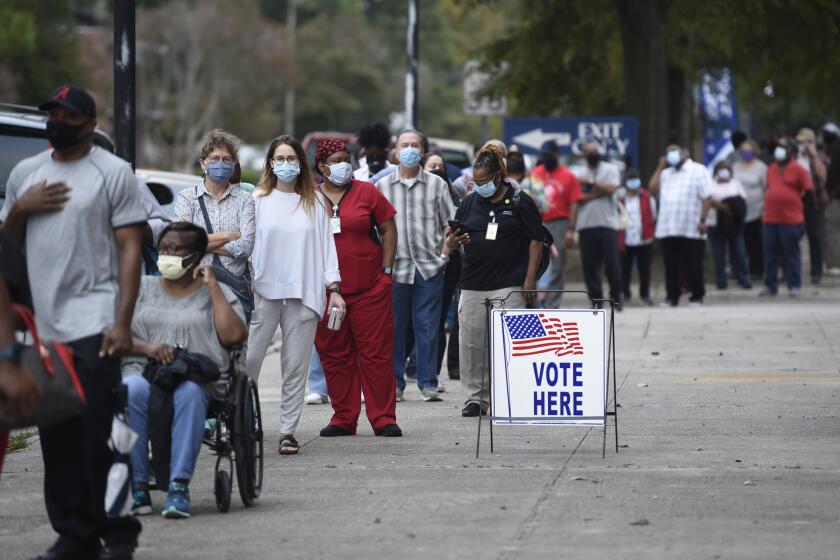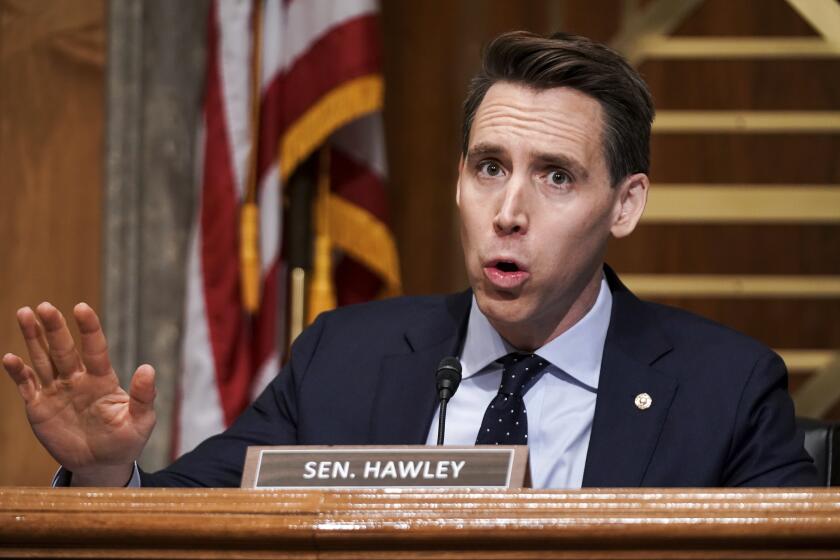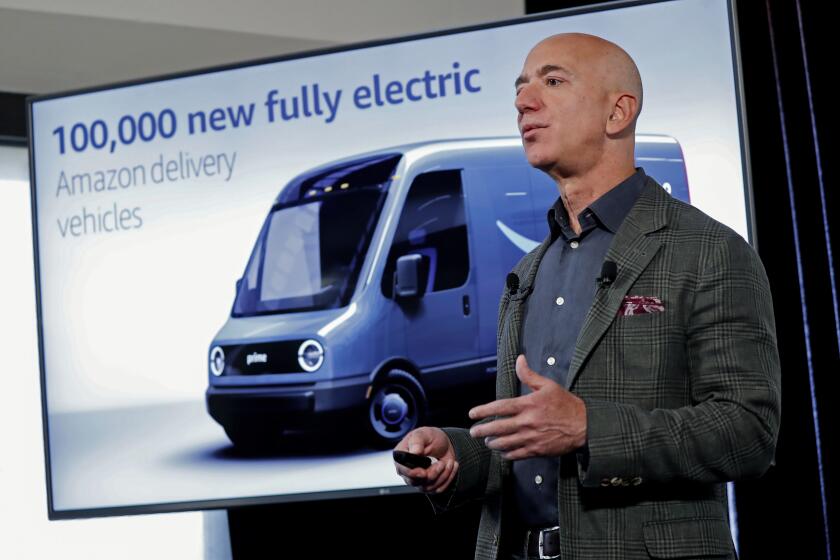Column: 100 CEOs met to discuss opposing anti-voting laws. Donât expect them to do anything

The best joke offered in recent days by that superb comedy stylist Senate Minority Leader Mitch McConnell (R-Ky.) was the one where he advised corporate CEOs to âstay out of politics.â
Whatâs so rib-tickling about McConnellâs joke, of course, is that politics has long since become a wholly-owned subsidiary of American industry.
Corporate CEOs have been getting exactly what they have wanted from the American political system for well more than a century.
Our policy halting direct contributions to members of Congress who voted against certification of the Electoral College results still applies.
— Intel Corp., which made a $15,000 contribution to a GOP reelection committee in February
As recently as 2017, corporations won a huge tax break. That happened with the help of then-Senate Majority Leader McConnell, who for his pains has received more than $4.3 million in corporate contributions over the last five years.
Big businessâ minions on Capitol Hill have kept the federal minimum wage stagnant at $7.25 an hour since 2009, a drop of 20% adjusted for inflation. Theyâve ensured that business regulators such as the Occupational Safety and Health Administration, Department of Labor and National Labor Relations Board remain under-resourced and overwhelmed with responsibilities. The same goes for the IRS, which lacks the funding and staff to devote adequate attention to corporations and the wealthy.
Get the latest from Michael Hiltzik
Commentary on economics and more from a Pulitzer Prize winner.
You may occasionally receive promotional content from the Los Angeles Times.
As we recently reported, Amazon â whose founder and chairman, Jeff Bezos, recently stated that heâd be in favor of an increase in the federal corporate tax rate from the current 21% â paid an effective rate of only 9.1% last year, and two years earlier even received a tax refund. Thatâs because the federal tax code bristles with loopholes for business.
These are all the harvest of corporate CEOs staying in politics, not staying out.
Georgiaâs voting law is even worse than youâve heard, and Delta and Coke arenât heroes about it.
Corporate CEOs occasionally stir themselves to speak out on social issues. Just this weekend, 100 CEOs met via Zoom to ponder an industrywide response to the surge in voter-suppression bills in state legislatures. The immediate target, obviously, was Georgiaâs openly racist voting âreforms,â which placed Atlanta-based corporations such as Delta, Coca-Cola and Home Depot in a tough spot.
Among the options discussed, according to the sessionâs hosts at the nonprofit Coalition for Inclusive Capitalism, were âreevaluating donations to candidates supporting restrictions on voter access and reconsidering investments in states that act on such proposals.â
Itâs encouraging, one might suppose, to see public companies standing up for democracy. News reports of the meeting referred to a âcorporate backlashâ against GOP policy.
Mmm; we shall see. The American corporate wish list of lower taxes and less regulation is carried by Republicans more than Democrats; CEOsâ commitments to expansive voting reforms favored by Democrats makes their opposition to Republican election policies suspect from the start.
The historical record, moreover, should counsel us to regard this nascent campaign largely as a public relations stunt.
How do we know this? Simple: Thatâs what has happened with such campaigns for principle in the past. They attract gobs of positive attention at the outset and evaporate as soon as public attention has moved on.
Consider the pledges by some 300 big corporations following the Jan. 6 Capitol insurrection to suspend contributions to Republican members of Congress who voted to object to certifying the presidential election results.
Donât believe corporations when they say theyâre reconsidering their political donations.
The pledges tended to be vague, going no further than pausing to reconsider their policies on political contributions. But what appeared at first to be a wall erected against politicians supporting seditious activity has already started to crumble.
JetBlue, which said in January that it would âtemporarily pause all contributions as we review the political landscape,â was the first company to donate directly to an election objector. The airline made a $1,000 contribution to Rep. Nicole Malliotakis (R-N.Y.), according to a company campaign finance filing on April 5 first reported by Bloomberg.
Malliotakis was one of 147 Republican senators and members of Congress who voted on Jan. 6 against certifying the election results.
In a statement relayed to Bloomberg, JetBlue said it would continue to contribute to candidates âwho have specific relevance to JetBlueâs network and business, as well as the aviation industry overallâ and that its relationships with those politicians helped the company âmaintain a voice in the room for all issues that are important to our crewmembers.â
Malliotakis is on the House Transportation and Infrastructure Committee, which oversees airlines.
Other companies have circumvented their own doubts about contributing to election objectors by donating to political committees. Thatâs how AT&T rationalized its $5,000 donation to the House Conservatives Fund, which is chaired by Rep. Mike Johnson (R-La.), another election objector. Every single one of the fundâs 10 âpriority membersâ also voted against certifying the vote.
When I asked AT&T to explain its contribution, it moved the goalposts. Its political action committees âcontinue to adhere to their policy adopted on January 11 of suspending contributions to the re-election campaigns of members of Congress who voted to object to the certification of Electoral College votes,â the company told me by email.
It said it had been âassuredâ that its contribution wouldnât go toward reelection campaigns, though it didnât say how it would know.
But AT&T didnât pledge on Jan. 11 to suspend only reelection campaign contributions. It said it was suspending âcontributions to members of Congressâ who voted against certifying the presidential vote.
The contribution to Johnsonâs committee is unmistakably a contribution to Johnson, reelection or otherwise. AT&T didnât respond to my request that it resolve the discrepancy. But if youâre looking for an example of how big companies weasel out of their promises, there it is.
As the indefatigable Judd Legum of the website Popular Information reported, Intel also found a way around its own pledge not âto contribute to members of Congress who voted against certification of the Electoral College results as we feel that action was counter to our companyâs values.â
Instead, the company made a $15,000 donation on Feb. 26 to the National Republican Campaign Committee. The committee manages reelection campaign funding for GOP representatives, of whom two-thirds voted against certifying the election results. The objectors included House Minority Leader Kevin McCarthy (R-Bakersfield) and his top lieutenant, Minority Whip Steve Scalise (R-La.).
âOur policy halting direct contributions to members of Congress who voted against certification of the Electoral College results still applies,â Intel told Legum. Indirect contributions, evidently, are still all right.
Whole Foods throws hundreds of part-timers off its health plan, as Jeff Bezos reneges on his pledge to dump shareholder value managing.
The fate of the 2019 pledge by 187 big-business CEOs to serve not just shareholders but all corporate stakeholders â employees, suppliers, customers and communities â gives us another data point to help analyze the value of high-profile corporate promises. The pledge was viewed as a possible sea change in how companies were managed. A âwatershed,â even.
One year later, however, the promise was revealed as empty. As we reported, a few companies raised their minimum wages, but typically either in compliance with or anticipation of government mandates to do so. Some consumer companies offered frontline workers âheroâ bonuses for their work during the pandemic, but withdrew them even before the pandemic ebbed.
The first CEO to abandon his pledge to dump the shareholder-value model was Amazonâs Jeff Bezos. After Bezos signed the pledge, his company cut health benefits for part-time employees at Whole Foods, which Amazon had acquired.
Business groups, including the Business Roundtable, which sponsored the 2019 pledge, continued to lobby to roll back environmental laws and make it harder for ordinary people to have a voice in corporate decision-making. Why, just a day or two after the big Zoom meeting of CEOs, the Business Roundtable unveiled its new ad campaign: Opposing the corporate tax increase being considered by the Biden administration.
Corporate Americaâs commitment to the democratic process could be gleaned from the way public companies treat their own voters â that is, their shareholders. The traditional principle was one share, one vote, which gave the putative owners of public corporations at least a theoretical voice in such fundamental issues as the election of directors and the pay of top executives.
Amazonâs Bezos endorses Bidenâs infrastructure plan â but he wonât be paying the cost.
Yet in many companies today, especially in the technology sector, shareholders are gerrymandered out of a fair vote through supermajority voting rights placed in the hands of founders and other insiders. In some companies, shareholders donât get a vote at all.
The condition of shareholder democracy is so poor that a 40% vote against management is considered a stupendous victory for a shareholder proposal. Even when such proposals win a majority, theyâre always advisory, not mandatory, so management doesnât have to act.
When more such proposals began to win higher proportions of votes â notably those demanding action on climate change â managements asked the Securities and Exchange Commission to tighten the rules on submissions. The SEC complied last year, with new regulations making it harder for shareholder voices to be heard; itâs proper to think of the SEC regulation as a corporate version of the Georgia voter-suppression law.
Itâs possible that the corporate opposition to voter suppression laws, even in its current rhetorical stage, might bear some fruit. It might lead GOP leaders in some of the 47 states with similar measures in their legislative hoppers to think twice.
But itâs proper to observe that Delta and Coca-Cola, which both issued statements declaring the Georgia law âunacceptableâ after its passage on March 25, failed to act when their opposition might have derailed it â before passage, not after.
Moreover, their statements came after they had sustained public obloquy for their silence. Thatâs a hint that the confab by their fellow CEOs this weekend was aimed at mollifying their public rather than an expression of firm principle.
The truth is that political reform wonât result from corporate initiatives. It requires legislation backed by public support â measures such as the John Lewis Voting Rights Act and H.R. 1, the For the People Act, which would expand and protect voting rights.
Letâs see Americaâs corporate CEOs come out for those measures. Then we can talk.
More to Read
Get the latest from Michael Hiltzik
Commentary on economics and more from a Pulitzer Prize winner.
You may occasionally receive promotional content from the Los Angeles Times.














